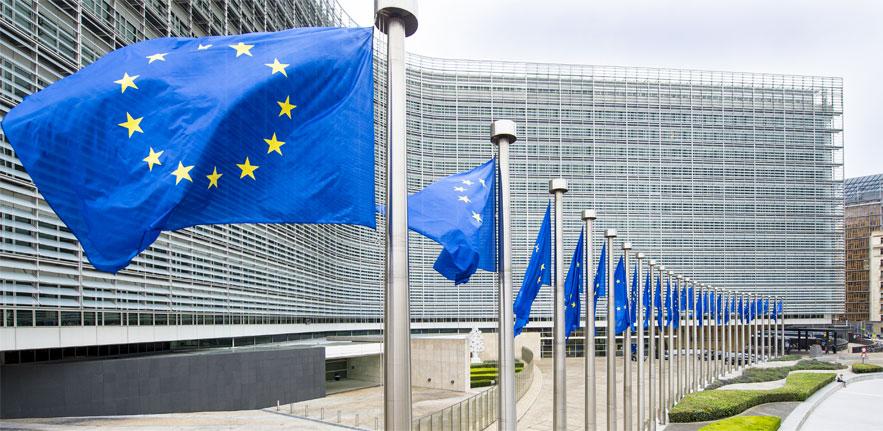
30 March 2022 - Today the European Commission released its First 2022 Circular Economy Package. This is a key moment for the transition towards a climate neutral and circular future. The package includes an array of horizontal and sector-specific legislation which aims to accelerate the transformation towards a European Circular Economy, including the widely anticipated Ecodesign for Sustainable Products Regulation (ESPR).
Download the rapid reaction here.
Register to the Taskforce’s event on the March Circular Economy Package here.
Martin Porter, Senior Strategic Adviser, Corporate Leaders Group Europe (CLG Europe) & Executive Chair, CISL Brussels said:
“The release of this set of Circular Economy Package is a significant moment. In the context of the war in Ukraine, it is critical that we speed up our move towards a circular economy, reducing our geopolitical dependencies on Russia through greater self-sufficiency whilst also protecting our planet. The long anticipated Ecodesign for Sustainable Products Regulation needs to be ambitious in its aims to deliver the European Green Deal, and coherent across wider EU industrial and climate initiatives to provide the certainty businesses need to scale up their actions.”
Rapid Reaction from the Materials and Products Taskforce: launch of the First 2022 Circular Economy Package
Today is a significant day for the European Green Deal with the publication by the European Commission of the First Circular Economy Package. The package includes an array of horizontal and sector legislation which aims to accelerate the transformation towards a European Circular Economy, including the widely anticipated Ecodesign for Sustainable Products Regulation.
This package comes in a complex geopolitical context. The Russian invasion of Ukraine has not only caused untold human suffering, but also precipitated widespread international condemnation and a re-assessment of relations between the EU and its partners with Russia, with profound long-term, global ramifications. As Europe faces this turning point, it needs to form a united approach across the EU at a time when rising energy prices have created added complexities for ambitious EU climate and sustainability policies.
The Taskforce for climate neutral and circular materials and products, a cross-sectoral progressive business grouping working to accelerate this transition, backs the key objectives as set out in the EU Green Deal and the Circular Economy Action Plan.
Our Taskforce supports the aims of Europe to reduce its dependencies on other countries. Whilst the focus of the debate thus far has been on gas, we see greater circularity playing a critical role in reducing our geopolitical dependencies externally. A greater circular economy in its nature allows us to reduce our requirement for fossil fuel imports, whilst also allowing us to live more self-sufficiently and reduce our imports of raw materials. Greater circularity would also allow us to create a sustainable model for our planet before it is too late. In this vein, it is key that we accelerate the transition to a European circular economy.
The Taskforce will publish a more in-depth analysis of these measures towards the end of April. However, here we set out our initial reactions to the different elements of the package as well as our wider beliefs surrounding the importance of building a European Circular Economy to meet our climate neutrality goals.
Why a European Circular Economy is needed
By 2050, the global population is expected to be consuming resources at a rate three times higher than the Earth can replenish. Global consumption of materials such as fossil fuels, metals and minerals is expected to double by 2060, while annual waste generation is projected to increase by 70 per cent by 2050. Production, consumption and waste linked to products are responsible for many types of pollution, including around 40 per cent of global greenhouse gas (GHG) emissions.i The retention of materials in the economy for as long as possible through much higher levels of re-use, recycling and circular designs, in addition to greater resource efficiency, are key to avoiding over-consumption and waste, supporting resource independence and sustainability in Europe as well as globally.
The shift towards a digitally-enabled, climate neutral and circular economy offers a tremendous opportunity to ensure the competitiveness of European industry in the longer term, ensuring that its businesses retain competitiveness in the context of the transition to meet the net zero by 2050 target.
Achieving a climate neutral, circular and competitively sustainable economy requires changes to how we produce and consume products. To meet the EU’s climate targets and sustainability aspirations, it is crucial to deliver on the green transition of energy-intensive and hard-to-abate industrial sectors.
The March 2020 Circular Economy Action Plan (CEAP) is one of the main building blocks of the Green Deal. It sets out numerous initiatives along the entire life cycle of products with the intention of achieving the EU’s climate goals, reducing pressure on natural resources and stopping biodiversity loss.
We believe today’s package is an opportunity to make climate and circular economy policies work much more closely together, by unlocking the full circularity potential of products to reduce GHGs and their wider environmental footprint.
Ecodesign for Sustainable Products Regulation (ESPR)
We welcome the much-anticipated launch of the Ecodesign for Sustainable Products Regulation (ESPR). As set out in our policy briefing, the ESPR aims to reduce waste and make products that are made or sold in Europe fit for a climate neutral, resource-efficient and circular economy. This will be essential to ensure the EU meets its climate commitments, while guaranteeing competitiveness of European industry in the longer term.
The absence of policies tackling embedded carbon or the replacement of virgin fossil fuels in products, as well as incentives offered to the fossil fuel industry, have made it difficult for innovative, low-carbon technologies and or intermediate feedstocks to be cost effective. We see today’s proposal as a key step to tackling this issue, which will benefit both consumers and businesses through more informed decision-making and cost savings due to reduced use of virgin raw materials and energy. A recent blog from Rockwool Group highlights the importance of making buildings last more than 50 years, but also to be built with easily re-usable and recyclable materials.
We welcome the introduction of a Digital Products Passport (DPP) which will help consumers and businesses to make informed choices, facilitate repairs and recycling and improve transparency. We look forward to supporting their design and implementation.
We recognise that much of the specific details for different sectors will arrive in the implementing acts, meaning there is a long road ahead between passage and delivery. We also note that a public consultation will be launched on the categories of products to be selected under the first working plan by the end of 2022, which will then subsequently need further time to implement.
We reiterate our key points from our policy briefing that the ESPR should follow the five core principles that will ensure an effective, coherent transition to a more circular economy:
- Be ambitious in its aims in delivering the Green Deal
- Build a progressive policy framework based upon competitive sustainability
- Improve transparency of product sustainability
- Support innovation and be future-proof
- Provide policy coherence across the wider EU industrial and climate initiatives.
Furthermore, we see a key role for building greater demand for sustainable products in the future. One way to do this is through circular procurement, which brings additional carbon and sustainability criteria in addition to economic and resource criteria during procurement, and in particular public procurement.
The Revision of the Construction Products Regulation
The Revision of the Construction Products Regulation (CPR) supports greater measures for sustainability in construction. This brings the sector in greater alignment with the European Green Deal. The proposed revisions contain stronger rules to support innovative business models, as well as enhanced provisions on market surveillance and enforcement. We welcome these new product requirements based upon sustainability and circularity principles.
Nonetheless, we see that, as with the ESPR, much of this revision will be based upon further legal instruments. While the proposal states that the revised CPR will align with the ESPR, there is no explicit link with the use of a DPP even if it states there is potential scope to do so. This is a missed opportunity, as doing so would create a link between the ESPR passporting system and existing measures such as Renovation passports or Digital Building Logbooks. This would ensure greater robustness of data, and benefits of lessons learnt on how data can be verified.
The EU Strategy for Sustainable and Circular Textiles
We welcome the introduction of a Textile Strategy, which looks seeks to tackle a sector with the fourth highest impact on the environment and climate change. We recognise that this strategy published today is a hugely important first step towards implementing regulation to support greater circular measures circularity in a complex sector, which has so far been subject to limited environmental and climate-related regulation.
The use of DPPs for Textiles helps build coherence across to the ESPR and builds harmonised standards. Moreover, the Textiles Strategy also includes other important measures, such as mandatory design requirements and transparency obligation on destroyed textiles, which will be regulated through the ESPR.
We note that a European approach is relatively nascent in this sector. As such we highlight that there is much work ahead to ensure a greener, more sustainable textile industry.
Empower Consumers for the Green Transition
Consumers are essential to the green transition. Transparency, consumer trust and strengthened consumer rights will reinforce the Circular Economy. This amends the Consumer Rights Directive and Unfair Commercial Practices Directive.
As highlighted through CLG Europe’s Report Tomorrow’s Market Today, enhanced transparency will lead to better outcomes for consumers through measures such as labelling, following the success of eco-labelling.
We will need further time to fully digest the contents, and we will provide further analysis later in April. As this is closely linked to the upcoming ‘green claims’ legislation which is to be presented in the second half of 2022, we note it is hard to gain a full picture of the measures the European Commission plan to propose. We hope that this will neither negatively affect the effectiveness nor passage of the two pieces of legislation, and we are keen to see policy coherence between the two files, as well as across the wider set of circular economy and climate legislation.
We will also be keenly viewing the intersect between this legislation and the Digital Products Passport set out in the ESPR as it develops. The passport will increase transparency in practices and impacts of products. This will have an added benefit for the consumer, allowing individuals to have a greater preference for low-carbon products and thereby increasing demand, creating a virtuous cycle.
Read the Taskforce’s policy briefing on the Ecodesign for Sustainable Products Regulation here.
Learn more about the Materials & Products Taskforce here.
i European Commission. (2020, September). Inception Impact Assessment, Sustainable Products Initiative. Retrieved from: https://ec.europa.eu/info/law/better-regulation/have-your-say/initiatives/12567-Sustainable-products-initiative





